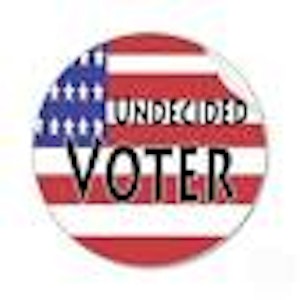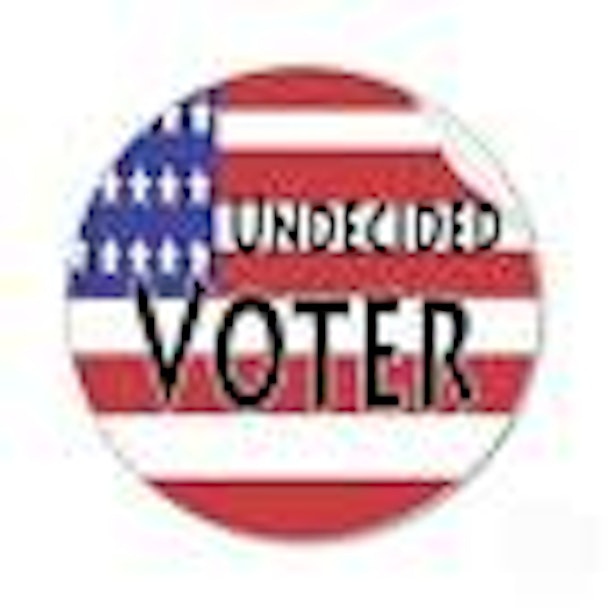The undecided voter may 'subconsciouly' have already cast their vote for president, study finds
In this election season, the undecided voters remains the biggest unknown when it comes to who will be the next president of the United States. Despite negative perceptions of both Hillary Clinton and Donald Trump, the subconscious tells a different story, according to a new study by the Center for Emotional Marketing, a brand strategy and innovation firm.


undecided voter
The study found that Trump has far more negative associations in the mind of the undecided voter than Clinton has. Moreover, national security is emerging as a lynchpin of the campaign, pushing undecided voters into Clinton's camp.
By analyzing each candidate's network of associations it has used for Fortune 100 brands for over 20 years, the Center assessed the viability of each candidate's personal brands, the keys to alleviating their negative perceptions and the strategy for winning over undecided voters.
The study surveyed dozens of undecided voters in Columbus, Ohio and Tampa, Florida following the first presidential debate on Sept. 26. The Center found that while voters do not trust Clinton, they associate more negative character traits – volatility, unpredictability, bombastic personality-- with Trump and these negatives are subconsciously undermining his image as the stronger national security candidate.
Surprisingly, in spite of Trump's strong emphasis on destroying ISIS and building a wall, voters' visualizations of the future reveal that safety and world peace are actually now more associated with Clinton. This represents a change from historical party positions in recent presidential races.
"Clinton's lack of trustworthiness and Trump's volatility prevents voters from forging an emotional connection with them. Like an array of caution signs and flashing lights, these negative associations alienate voters, signaling to them: 'stay away,'" said Leslie Zane, founder and president, Center for Emotional Marketing. "Voters ultimately make their decision based on character traits and value alignment, not on accomplishments. Trump's greater number of negative character traits alienate undecided voters even more than Clinton's perceived deceitfulness."
The 'Wall' is a Negative Symbol
The Center discovered that Trump's promise to build a wall to keep Mexican immigrants out of the U.S. has become a major negative symbol of his campaign. While Trump may believe the wall sends a message of enhanced security, in fact, undecided voters view it as racist, anti-American and childish.
"It is the exclusionary and impulsive nature of a wall that has made it a negative symbol," said Tom Gosline, vice president, Center for Emotional Marketing. "Voters are very concerned about security, but they long for a doorway with enhanced vetting procedures rather than a solid wall."
The Center also found that voters imagined two different countries led by Clinton versus Trump. For the Trump world, they envisioned abundant jobs with everyone, from rich to poor, thriving and advancing. In Clinton's world, where healthcare and education were free, there was an unmistakable aura of peace and tranquility not present in the Trump world. Undecided voters revealed that Trump's financial success was alluring, but they felt that Clinton's world would be safer for their children and the country.
Clinton's 'Duplicity' Years in the Making
Clinton's experience—her years as a Senator and Secretary of State— is her greatest positive association, according to the research. Although voters could not identify any specific accomplishments, they have a generalized sense that she knows the system and will deal with foreign leaders diplomatically. However, Clinton's perceived deceitfulness casts a vast negative halo over her years of hard work. This web of mistrust in voters' subconscious has been years in the making — comprised of multiple negative memories from scandals in Arkansas and Benghazi to deleted emails and most recently her health. Projective exercises revealed that Clinton's character was often expressed with imagery of duplicity – snakes, masks and two-faced creatures.
"Because the human brain is always making new associations, both candidates can still change perceptions but they must create new positive associations and take down the barriers between themselves and voters," said Zane. One of the most effective ways to do this is to match voters' positive memories of the candidates from the past.
"Much like consumer brands, the key to winning over undecided voters is often to return to their roots and tap into subconscious associations that are highly positive but currently dormant."
Unlike traditional polling that only captures what people say they're going to do, the Center's approach uncovers the network of subconscious associations that drive what they're more likely to do in the voting booth. The process revealed that while undecided voters say that they're still deciding, Trump's abundance of negative associations are more concerning and are pushing these voters towards Clinton.

